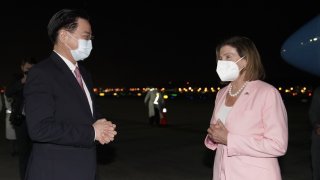
- Shares in the Asia-Pacific were mostly higher Wednesday as geopolitical tensions between the U.S. and China intensified over U.S. House Speaker Nancy Pelosi's visit to Taiwan.
- Pelosi arrived in Taiwan on Tuesday night local time amid warnings from Beijing. Taiwan is a democratic self-ruled island that China claims as a runaway province.
- Foreign Ministry spokesperson Hua Chunying tweeted that Pelosi's visit was a "major political provocation."
SINGAPORE — Asia markets mostly rose, but mainland China indexes gave up early gains and turned negative Wednesday as geopolitical tensions between the U.S. and China intensified over U.S. House Speaker Nancy Pelosi's visit to Taiwan.
Watch NBC6 free wherever you are
>The Shanghai Composite was 0.71% lower at 3,163.67, and the Shenzhen Component lost 1.14% to 11,982.26, dragged down in part by Chinese battery maker and Tesla supplier Contemporary Amperex Technology. CATL shares dropped nearly 4%.
On Tuesday, before Pelosi's arrival, both the Shanghai Composite and Shenzhen Component fell as much as 3% in the trading session.
Get local news you need to know to start your day with NBC 6's News Headlines newsletter.
>Hong Kong's Hang Seng index advanced 0.33% in the final hour of trade.
Taiwan's Taiex recovered from slight losses to close 0.2% higher at 14,777.02.
Elsewhere in Asia, the Kospi in South Korea gained 0.89% to 2,461.45 and the Kosdaq was 1.37% higher at 815.36.
Money Report
Japan's Nikkei 225 rose 0.53% to 27,741.9 and the Topix index was up 0.27% at 1,930.77.
The S&P/ASX 200 in Australia, however, fell 0.32% to 6,975.9.
MSCI's broadest index of Asia-Pacific shares outside of Japan was about flat.
Pelosi arrived in Taiwan on Tuesday night local time amid warnings from Beijing.
Foreign Ministry spokesperson Hua Chunying tweeted that Pelosi's visit was a "major political provocation," while a spokesperson for the People's Liberation Army's Eastern Theatre Command said it would conduct "a series of joint military operations around the Taiwan Island from the evening of August 2."
Those operations include long-range combat fire live shooting in the Taiwan Strait and conventional missile firepower test launching, the statement said, calling them "stern deterrence" and a grave warning.
State news agency Xinhua reported that the military will conduct exercises including live-fire drills from Aug. 4 to 7 in areas around Taiwan.
"However, these PLA exercises are more performative signals than preparations for war; crisis is not yet base case and the chance of kinetic conflict remains very low," Eurasia Group analysts wrote in a note dated Aug. 2.
The note pointed out that the PLA did not interfere with Pelosi's flight to Taiwan.
China's ministry of commerce also said it would stop exports of natural sand to Taiwan, according to a Chinese-language statement on its website.
In economic news, China's Caixin Services Purchasing Managers' Index for July came in at 55.5, up from 54.5 in June. It's also the highest since April 2021, according to Eikon data.
The 50 mark for PMI readings separate expansion or contraction from the previous month.
Currencies and oil
The U.S. dollar index, which tracks the greenback against a basket of its peers, was at 106.308, after a recent climb following signals from Fed officials that the central bank is not done with raising interest rates.
Kristina Clifton, an economist at Commonwealth Bank of Australia wrote in a Wednesday note that the lift in U.S. Treasury yields affected the dollar-yen.
The Japanese yen traded at 133.06 per dollar, weaker compared to earlier in the week.
"USD/JPY made a sharp U‑turn overnight, rising above 133.0 after trading as low 130.40 yesterday," Clifton wrote.
The Australian dollar was at $0.6933, after it fell following the Reserve Bank of Australia's rate hike on Tuesday. Clifton said falling oil prices have also weighed on the Aussie dollar.
Oil futures fell ahead of the OPEC meeting. U.S. crude futures were down 0.68% at $93.78 per barrel, while Brent crude futures slipped 0.6% to $99.94 per barrel.






